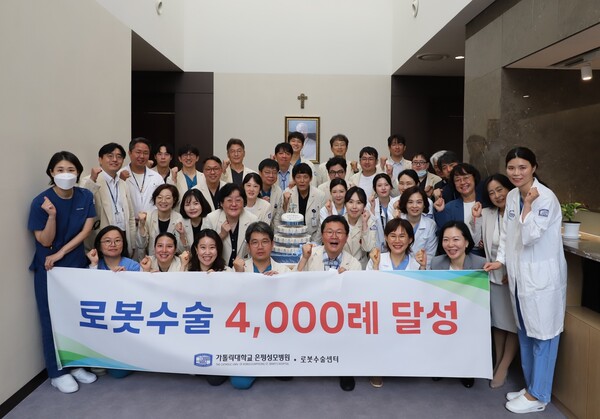The Catholic University of Korea Eunpyeong St. Mary's Hospital has performed over 4,000 robotic surgeries since its opening six years ago.
The hospital’s Robotic Surgery Center has utilized its state-of-the-art fourth-generation robotic surgery system, the Da Vinci Xi, in more than 1,000 cancer surgeries and organ transplants, including those for prostate, kidney, thyroid, endometrial, colon, and stomach cancers.

According to Eunpyeong St. Mary's Hospital, the Robotic Surgery Center has experienced rapid growth since its opening in April 2019. It reached 100 cases within five months of opening, followed by 3,000 cases in June 2024, and has performed more than 1,000 additional surgeries in just one year, reaching a cumulative total of 4,000 cases.
Since its inception, the Robotic Surgery Center has focused on highly technical cancer surgeries, performing precision surgery using minimally invasive techniques in more than 1,000 cancer procedures, with a primary emphasis on treatments that preserve the function of the affected organ whenever possible.
In recent years, it has expanded the use of robotic surgery to more complex and challenging areas of cancer surgery.
In the case of esophageal cancer, which is usually treated by the Thoracic Surgery Department, Eunpyeong St. Mary's Hospital offers more specialized treatment for patients with stomach and esophageal cancer by performing robotic surgery directly under the supervision of gastrointestinal surgeons. In addition, head and neck cancers (oral, tonsil, and throat cancers), which require precise access to narrow areas in the oral cavity, are also actively performed, and thyroid cancer is also treated with robotic surgery through intraoral access to reduce the scarring burden.
Eunpyeong St. Mary's Hospital is also applying robotic surgery in the field of organ transplantation, with notable results. In July 2023, it successfully performed the first robotic kidney transplant on a brain-dead person in Korea. In November of the same year, it successfully performed a robotic kidney transplant using a living donor, establishing a robotic transplant system that encompasses both brain-dead and living donor transplants.
In addition, Eunpyeong St. Mary's Hospital is leading the way in robotic surgery, which not only improves the survival rate but also considers the quality of life of patients after surgery. Robotic surgery is applied to diseases such as uterine fibroids, adenomyosis, and endometriosis, which are very large and complicated to operate on, to precisely excise the lesions while focusing on preserving the uterus and maintaining its function, thereby increasing the chances of future pregnancy and contributing to the restoration of fertility.
In the case of bladder cancer surgery, which is usually performed only after resection of the cancerous lesion and urinary diversion, Eunpyeong St. Mary's Hospital also performs neo-cystoplasty to help patients maintain a more natural urination function after surgery. In addition, for abdominal wall hernia surgery, which is usually performed through open surgery, Eunpyeong St. Mary's Hospital applies robotic hernia surgery to reduce complications that can occur after open surgery and minimize the recovery period.
“We were able to achieve the meaningful achievement of 4,000 robotic surgeries in six years of opening thanks to the passion and efforts of all the medical staff of the robotic surgery team, who have been dedicated to every patient,” said Dr. Namgoong Jeong, director of the Robotic Surgery Center (professor of obstetrics and gynecology). “We will continue to challenge difficult and arduous surgeries without hesitation so that we can bring hope to patients' lives with more sophisticated and safe surgeries.”

